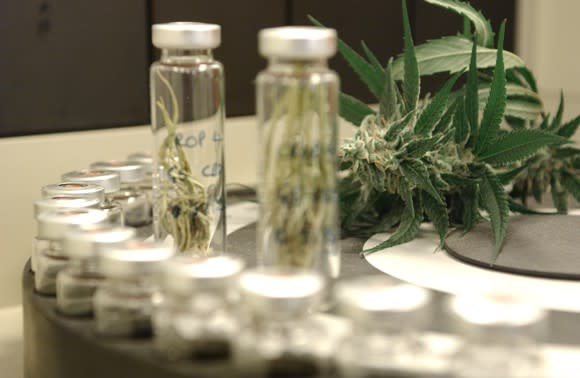This Marijuana Stock Is the Perfect Middleman for Pot Enthusiasts and Opponents
The legal weed industry is budding before our eyes, with U.S. sales slated to grow by 45% in 2018 -- likely a result of California opening its doors to recreational pot sales -- according to Marijuana Business Daily's report, "Marijuana Business Factbook 2017." Between 2016 and 2021, U.S. sales are forecast to quadruple to roughly $17 billion, which is a big reason why investors have driven marijuana stock valuations through the roof.
Sales growth has also been pushed higher thanks to a shift in the way the public views cannabis. Many national polls over the past year have demonstrated clear support in favor of legalization, with Gallup's nearly five-decade-old survey showing the strongest favorability (64% in favor of nationwide legalization).

Image source: Getty Images.
Yet in the United States, marijuana remains firmly entrenched as a Schedule I substance, meaning it's entirely illegal, highly prone to abuse, and not recognized as having any medical benefits. Cannabis enthusiasts would argue that it does have the potential to provide medical benefits, while opponents of the drug urge caution due to unknown side effects of the drug. The debate over which side is correct has been ongoing for a long time. Interestingly enough, one marijuana stock provides evidence for both sides of the argument: GW Pharmaceuticals (NASDAQ: GWPH).
Yes, cannabis could offer medical benefits
Until recently, GW Pharmaceuticals had been the undisputed largest pot stock by market cap, but it was surpassed by a small handful of Canadian cannabis growers that are preparing for the expected legalization recreational weed this coming summer. GW Pharmaceuticals is, however, still the undisputed king of all cannabinoid-based drug developers.
The company has an opportunity in 2018 to do something that no other drug developer in the U.S. has done before it: get the Food and Drug Administration (FDA) to approve a cannabinoid-derived drug. Though other cannabis-associated substances have been approved before, they've all been synthetic derivations, and not based on the actual cannabinoids found in the cannabis plant.

Image source: Getty Images.
The experimental drug in question that's currently under review by the FDA is Epidiolex, a cannabidiol-based medicine designed to treat two rare forms of childhood-onset epilepsy – Dravet syndrome and Lennox-Gastaut syndrome. Cannabidiol is the non-psychoactive component of cannabis. In two separate late-stage studies for each indication, Epidiolex met its primary endpoint of statistical significance with regard to reducing seizure frequency from baseline. In fact, in Dravet syndrome it tripled the reduction in seizure frequency from baseline (39%) relative to the placebo (13%).
With no medicines on the market to treat either of these rare epilepsy indications, Epidiolex could become the first, and in the process generate north of a half-billion in annual sales for GW Pharmaceuticals. It would also unequivocally demonstrate, with the FDA's approval, that cannabinoids do offer medical benefits.
No, cannabis isn't necessarily a game-changer or a fix-all drug
Unfortunately, GW Pharmaceuticals has also shown the scientific community that cannabis isn't a cure-all drug, even if it's demonstrated positive evidence in previous university-run studies in a variety of indications.
For example, back in 2015, the company reported that its oramucosal spray Sativex, a drug approved in more than a dozen countries outside the U.S. to treat spasticity associated with multiple sclerosis, failed to meet its primary endpoint in three U.S. phase 3 trials for the treatment of pain in patients with advanced cancer who experience inadequate analgesia while on opioid therapy. Though cannabis is often prescribed as a cancer-pain medication in a number of medically legal states, it failed with flying colors in GW Pharmaceuticals' pivotal trials.

Image source: GW Pharmaceuticals.
Then, just this past week, the company announced disappointing preliminary clinical results from its phase 2a study involving GWP42006, a cannabidivarin-based experimental medicine for the treatment of inadequately controlled focal seizures. Both the GWP42006 group and placebo group demonstrated a roughly 40% reduction in focal seizures relative to baseline, meaning there was no statistical significance. However, it is worth noting that GW Pharmaceuticals' believes the placebo group response to be abnormally high, and it's currently reviewing its next steps. Further, the GWP42006 group had more treatment emergent adverse events (73%) than the placebo group (48%).
Long story short, even if cannabis is medicine, it's not necessarily a game-changer for patients -- at least until FDA-approved clinical trials says it is.
Don't forget about what happens if weed's scheduling is changed
Investors caught in the middle of this debate over legalization should also keep at the forefront of their minds that a rescheduling of cannabis may not necessarily be a win.
Pro-legalization enthusiasts have been pushing for pot to be removed from the scheduled list of drugs altogether, although that seems unlikely to happen without lawmakers receiving copious amounts of clinical data outlining the benefits and risks of cannabis use. A far likelier move would be for marijuana to be reclassified as a Schedule II drug. Under such a classification, cannabis would be deemed as having medical benefits, albeit the potential for abuse is still recognized as high.

Image source: Getty Images.
Sounds decent so far, right? Well, here's the issue: as a Schedule II substance, the medical marijuana industry would come under the strict oversight of the FDA. As a result, the FDA would be in control of regulating marketing and packaging, and it could oversee the growth and distribution of cannabis to ensure that the content of tetrahydrocannabinol (THC), the psychoactive component of cannabis, remains consistent from crop to crop. Most importantly, it could require that clinical studies be run to verify claims that marijuana offers clinical benefits. This would be a costly, time-consuming affair that could reduce access to medical pot for years to come, even if it were technically legal as a Schedule II drug.
With red tape bogging down federal researchers and universities, GW Pharmaceuticals and its cannabinoid-based drug trials may be the key to industry expansion or rescheduling.
More From The Motley Fool
Sean Williams has no position in any of the stocks mentioned. The Motley Fool has no position in any of the stocks mentioned. The Motley Fool has a disclosure policy.

 Yahoo Finance
Yahoo Finance 